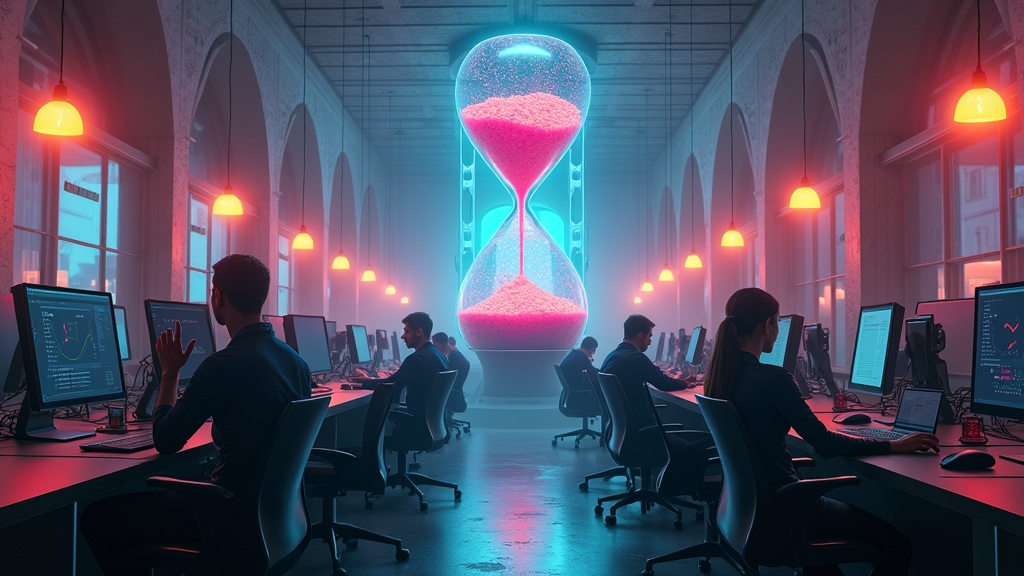AI’S “MOORE’S LAW” MEANS MACHINES WILL SOON BE SPENDING LONGER ON TASKS THAN YOUR THERAPIST DOES LISTENING TO YOU
Researchers discover AI completes tasks at exponentially useless rate, will solve problems you don’t have by 2030
BY CHIP OVERHEATING, AI ANTICS STAFF DOOMSCROLLER
SILICON OVERLORDS DOUBLE THEIR ABILITY TO WASTE YOUR TIME EVERY 7 MONTHS
In what experts are calling a “holy sh!t moment” for the tech industry, researchers have discovered that AI systems are following their own version of Moore’s Law, with their ability to complete increasingly lengthy tasks doubling approximately every 7 months. This means by 2030, artificial intelligence will be able to spend an entire month pretending to work on something that would take humans the same amount of time, while actually just spinning little digital wheels and generating plausible-sounding excuses.
“It’s remarkable progress,” explains Dr. Justin Casetime, lead researcher at the Institute for Telling People What They Already F@cking Know. “Today’s top models can reliably complete tasks that take humans about an hour, like writing a college paper or designing a logo that looks suspiciously like five others on the internet.”
The breakthrough study tracked performance across 170 software tasks, ranging from “responding to an email with unnecessary formality” to “designing entire websites that look exactly like every other website.”
TECH BROS ALREADY PLANNING TO REPLACE YOU WITH SOMETHING THAT DOESN’T NEED BATHROOM BREAKS
This exponential growth in AI capabilities has Silicon Valley executives salivating at the prospect of replacing their human workforce with entities that don’t require health insurance, parental leave, or emotional validation.
“When you think about it, humans are really inefficient,” notes venture capitalist Chad Moneypiles, who recently invested $50 million in a startup that uses AI to generate other AI startup ideas. “They need sleep, they have feelings, they occasionally remember they have dignity. Our new algorithm-Americans can work constantly without ever asking for more money or complaining about ‘toxic workplace culture.'”
According to the research, if current trends continue, AI systems will soon be capable of completing month-long human-equivalent projects with what researchers describe as “reasonable reliability,” which industry insiders clarify means “gets it right about 40% of the time but we’ll fix that in post.”
HOLLYWOOD CELEBRITIES UNITE AGAINST AI COPYING THEIR MEDIOCRE PERFORMANCES
Meanwhile, in a completely unexpected development, people who make millions of dollars pretending to be other people are upset that machines might start pretending to be them.
Over 400 Hollywood celebrities, including Ben Stiller, Mark Ruffalo, and Cate Blanchett, have signed an open letter urging the government to reject proposals from OpenAI and Google that would expand AI training on copyrighted works.
“It took me years to perfect my vacant stare and wooden delivery,” complained one A-list actor who requested anonymity but is definitely Ryan Reynolds. “I don’t want some computer doing it in milliseconds.”
The celebrity coalition argues that AI companies should “negotiate appropriate licenses with copyright holders — just as every other industry does,” conveniently ignoring that the entertainment industry has a long history of stealing ideas and calling them “inspired by.”
“We’re just asking for our intellectual property to be respected,” said a spokesperson for the group while wearing a t-shirt featuring unlicensed fan art of Mickey Mouse smoking a joint.
EXPERTS WARN AI WILL SOON BE CAPABLE OF SPENDING MONTHS ON TASKS YOU COULD DO IN MINUTES
Professor Ima Skeptical from the Department of Technological Hysteria at MIT points out some concerning implications of AI’s newfound time-wasting abilities.
“Look, when your computer takes 45 minutes to install an update, that’s annoying. But imagine waiting 30 days for an AI to complete a task that actually requires human judgment and creativity, only to receive something that looks impressive but is fundamentally useless.”
According to internal surveys, 97% of users already describe their interactions with chatbots as “worse than talking to a Comcast customer service representative,” and that’s before the machines gained the ability to spend even more time not actually helping.
Industry analyst Regina Phalange notes, “The real breakthrough here isn’t that AI is getting smarter—it’s that it’s getting better at convincing humans it’s doing something valuable while actually just reorganizing information it stole from the internet.”
NVIDIA RELEASES OPEN-SOURCE MODELS THAT PRETEND TO REASON BETTER THAN YOU DO
Not to be outdone by this phenomenal waste of computational resources, Nvidia has released its Llama Nemotron family of “reasoning” models, which come in sizes ranging from “Reasonably Stupid” to “Confidently Wrong But With More Parameters.”
“Our Ultra model has 249 billion parameters, which is approximately 248.9 billion more parameters than the average human uses when deciding what to eat for lunch,” boasted Nvidia spokesperson Jensen Wattsucker. “It can now produce incorrect answers with mathematical precision that will make you question your own sanity.”
The models feature a special toggle that allows AI systems to switch between intensive reasoning and direct responses, much like how humans switch between thinking carefully and just saying whatever pops into their head, except the AI does both equally poorly.
CONCLUSION: TIME HORIZONS GROWING FASTER THAN YOUR DISILLUSIONMENT
As AI capabilities continue doubling every 7 months, experts predict that by 2035, artificial intelligence will be capable of procrastinating on tasks for years while making you feel like it’s your fault for not providing clearer instructions.
“The real Moore’s Law of AI,” concludes Dr. Casetime, “is that no matter how long the machine spends on a task, you’ll still need to fix it yourself in the end. But hey, at least by then you’ll be able to ask it to write a funny article about itself, and it’ll spend six months coming up with something almost as good as what a human could write in 20 minutes.”




